|
East Bay (Battery Road)
Dungeness
01797 320314
http://thepilotdungeness.co.uk/
https://whatpub.com/pilot-inn
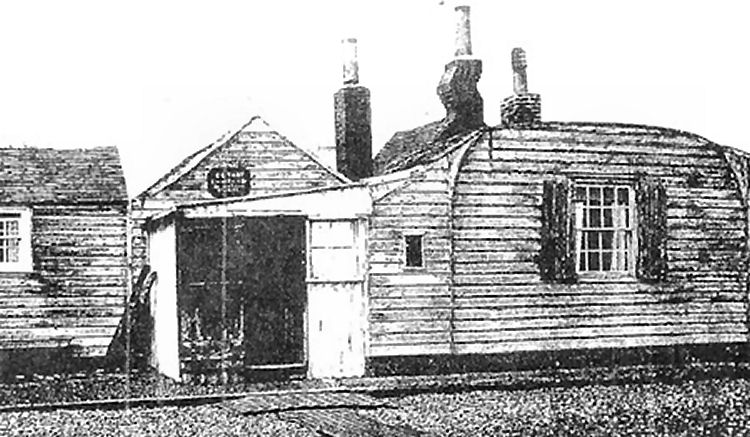
Above photo circa 1909, taken from
https://theromneymarsh.net/ accessed March 2021. |
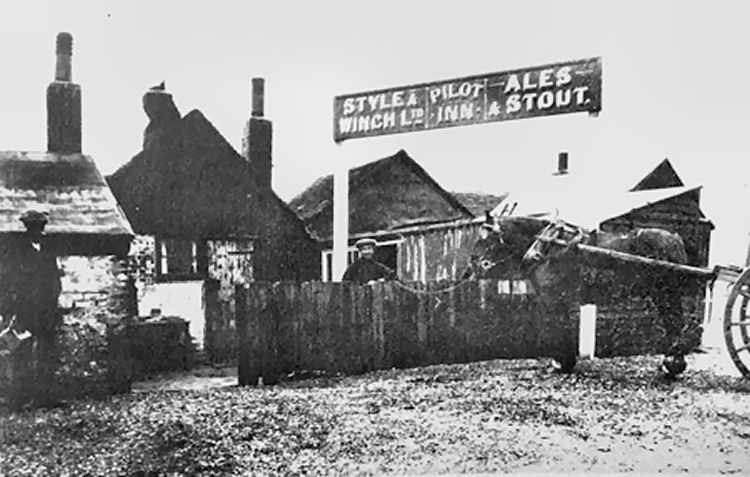
Above photo circa 1910, showing the rear taken from
https://theromneymarsh.net/ accessed March 2021. |
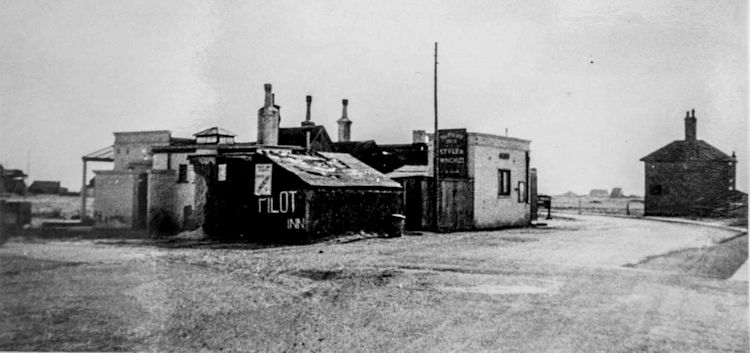
Above photo, date unknown. |
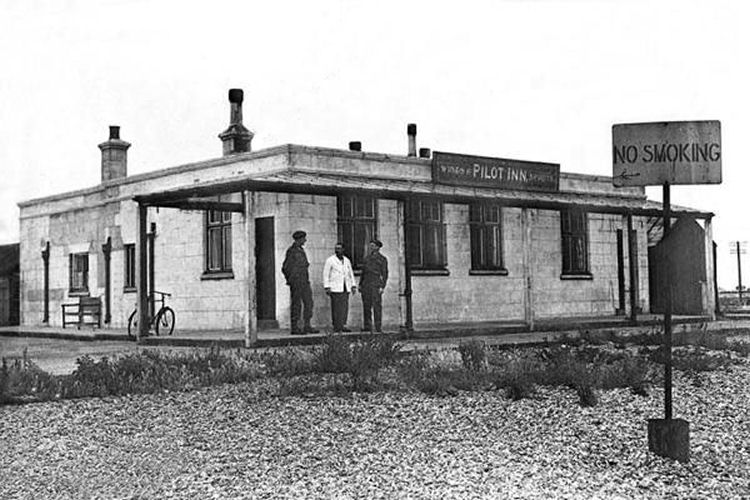
Above photo, date unknown. |
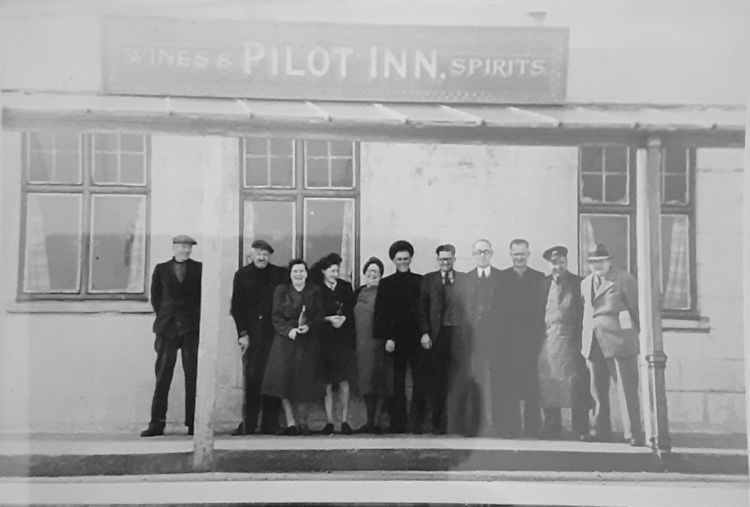
Above photo, 1940, showing John Crew's grandmother, Nana Flack, 5th from
left. Pop Flack, 4th from left. Photo from John Crew. |
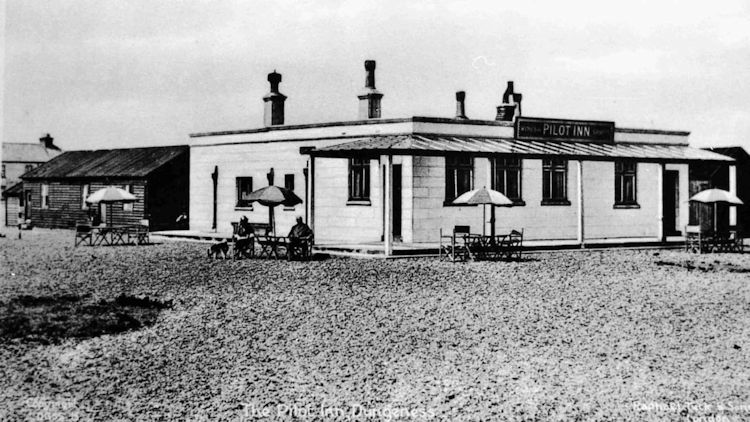
Above photo, date unknown. |
|
From Barclay, Perkin's Anchor Magazine. Volume XV, No.6, June 1935. Sent by Rory Kehoe.
The "Pilot" Inn Dungeness.
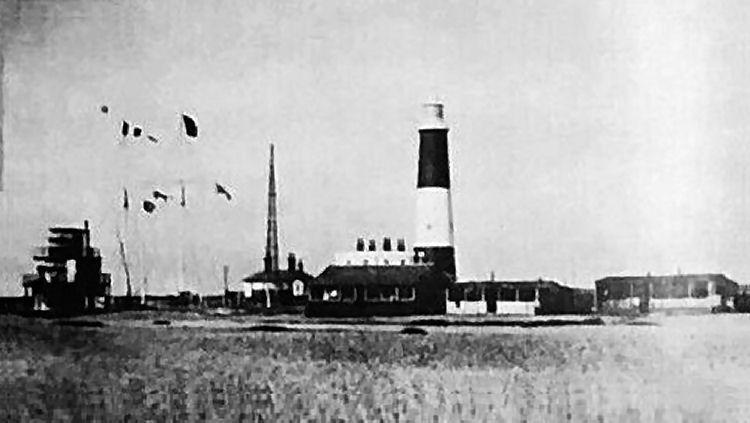
South of Lydd, Kent, the Dungeness headland points out into the
Channel. Locally, the area is known as "the Beach" and it would be
difficult to find a larger stretch of pebbles anywhere in England, or a
finer area for sea-fishing.
From Lydd, the road goes as far as the "Pilot," the well-known house
of call, where there is good accommodation for fishing parties and
others.
Mr. William Browne, who has recently taken over the licence, can
offer every comfort to those wishing to stay in the district, either for
the fishing or to explore part of the coast which is unique.
The road ends at the "Pilot" and beyond, travel is difficult, except
in a peculiar form of "snowshoes" found only at Dungeness and consisting
of a shaped board strapped to the feet. Carts too require wheels
eighteen inches wide to prevent them sinking into the pebbles and it is
best to leave your car at the "Pilot" garage.
We can recommend a visit to the beach and a tramp over the pebbles to
the lighthouse or the coastguard station and eventually back to the
"Pilot," calling perhaps on the way at the "Ship," or the "Jolly
Fisherman," the "Britannia," or the "Hope & Anchor."
The photo caption reads...
The lighthouse and coastguard station on the Dungeness Headland. This is
a most interesting spot to visit when one wants a quiet but delightful
day by the sea in Kent. The above article describes a pleasant ramble. |
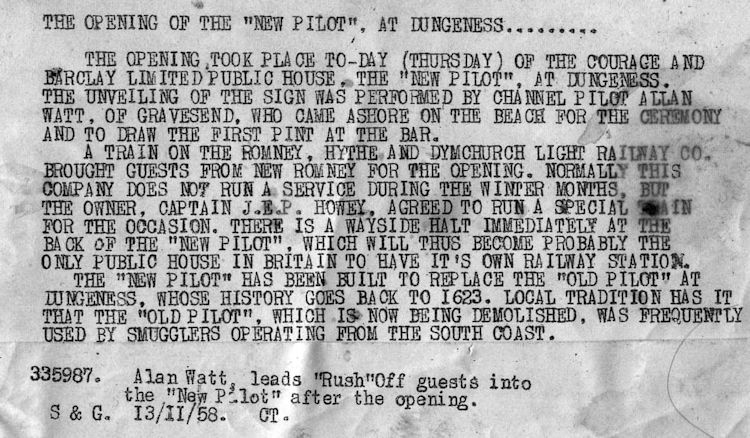
Above says the following:-
The opening of the "New Pilot", at Dungeness.
The opening took place to-day (Thursday) of the Courage and Barclay
Limited Public House, the "New Pilot," at Dundeness. The unveiling of
the sign was performed by Channel Pilot Allan Watt, of Gravesend, who
cams ashore on the beach for the ceremony and to draw the first pint of
the day.
A teain on the Romney, Hythe and Dymchurch light railway Co. brought
guests from the New Romney for the opening. Normally this company does
not run a service during the winter months, but the owner, Captain J. E.
P. Howey, agreed to run a special train for the occasion. There is a
wayside halt immediately at the back of the "New Pilot," which will thus
become probably the only public house in Britain to have its own railway
station.
The "New Pilot" has been built to replace the "Old Pilot" at
Dungeness, whose history goes back to 1623. Local tradition has it that
the "Old Pilot," which is now being demolished, was frequently used by
smugglers operating from the south coast.
335987. Alan Watt, leads "Rush" Off guests into the "New Pilot" after
opening.
S & G 13/11/1958. CT. |
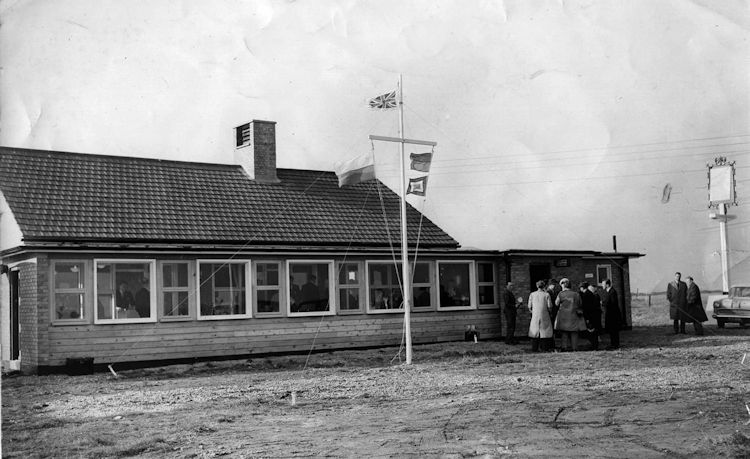
Above photo, 13 November 1958 showing the new building. |
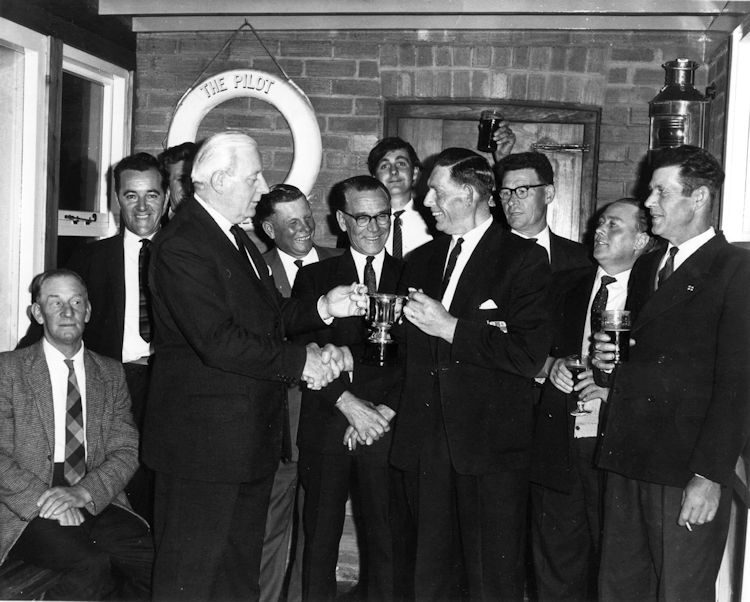
Above photo, 13 November 1958, showing the opening of the new building. |
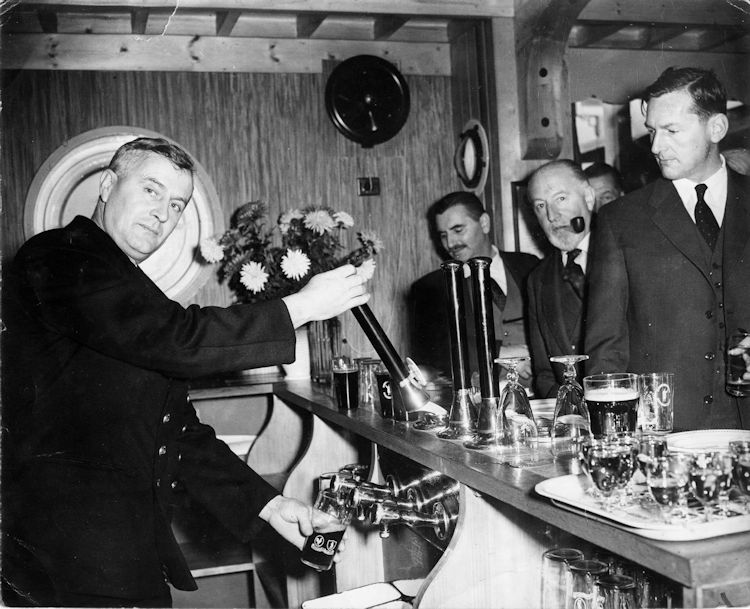
Above photo, 13 November 1958, showing the opening of the new building.
Pilot Allan Watt pulling first pint. |
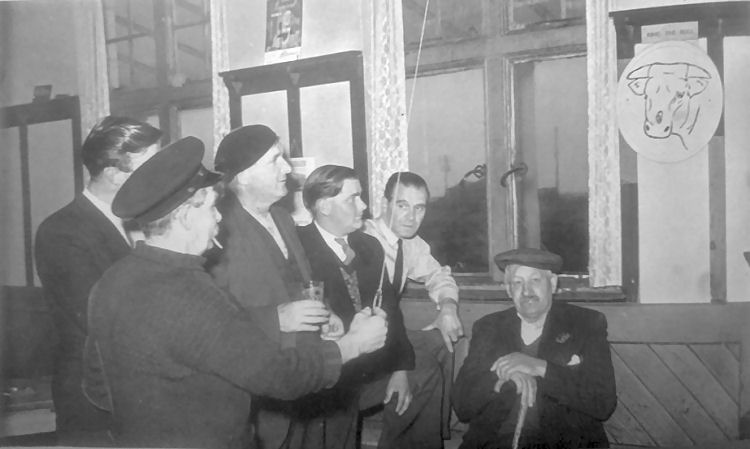
Above photo, circa 1950, kindly sent by Rory Kehoe. Playing a game of
"Ringing the Bull." |
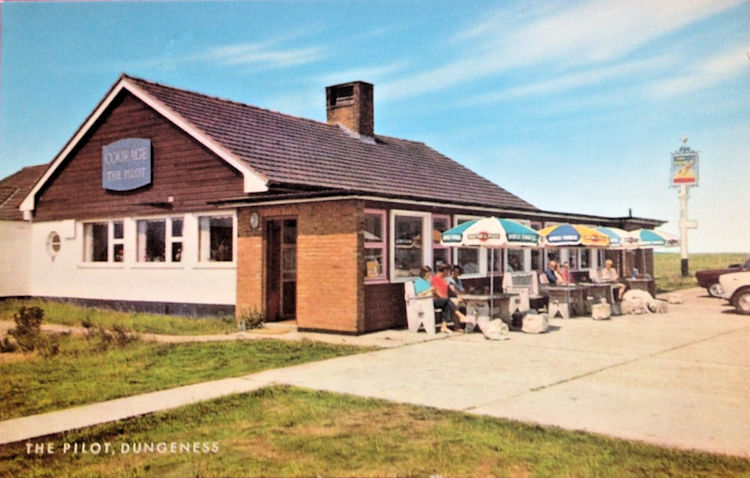
Above postcard, circa 1967, kindly sent by Rory Kehoe. As a result of
various brewery mergers in the late 1950s and early 1960s, which
certainly kept pub signwriters busy, when this photograph was taken the
Pilot was sporting its new Courage signage. |
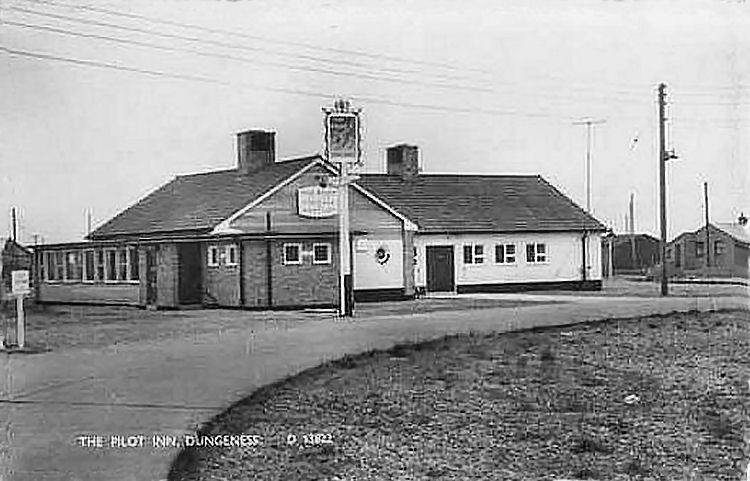
Above postcard circa 1969. |
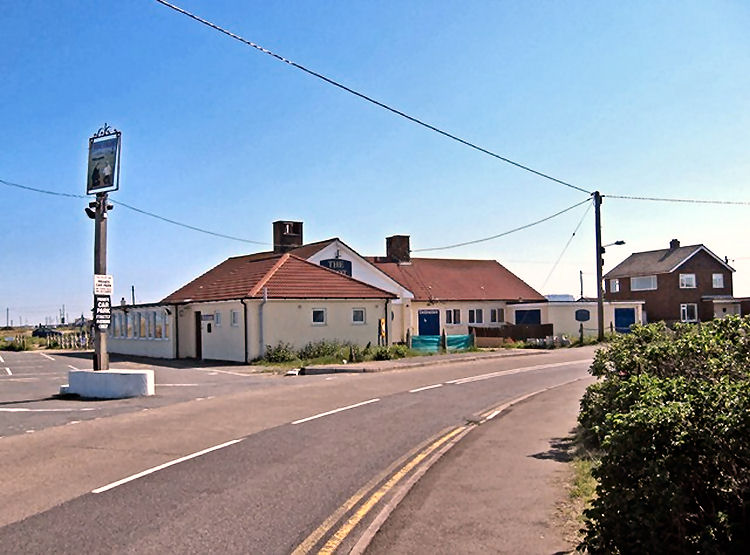
Above photo 2010 by P L Chadwick
Creative Commons Licence. |
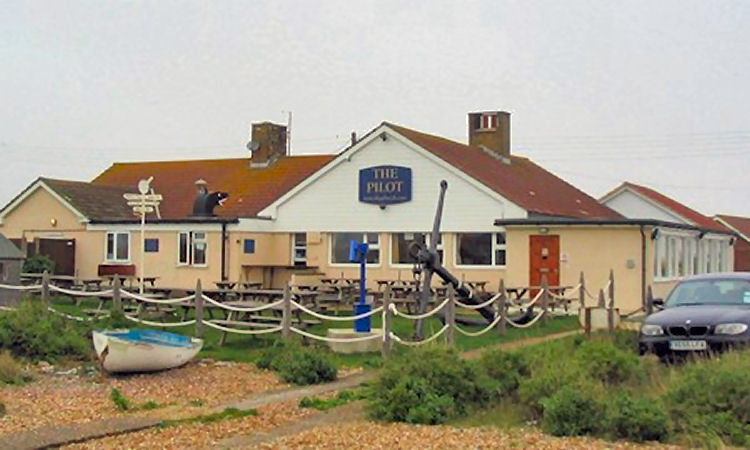
Above photo, 2017. |
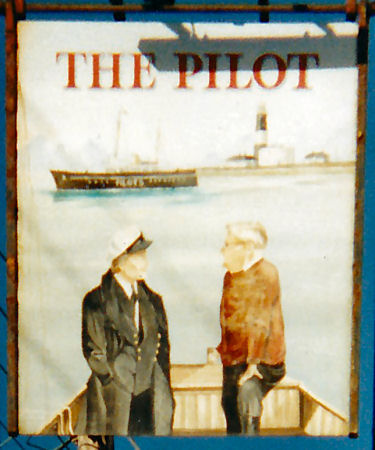 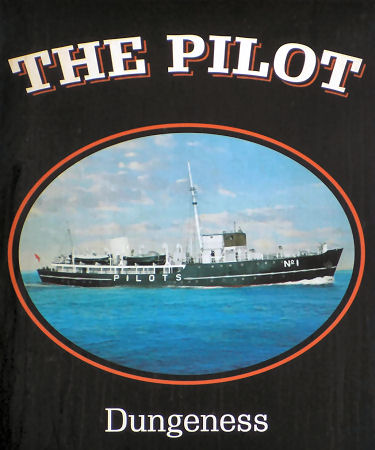
Above sign left, 1990, sign right, 2015.
With thanks from Brian Curtis
www.innsignsociety.com. |
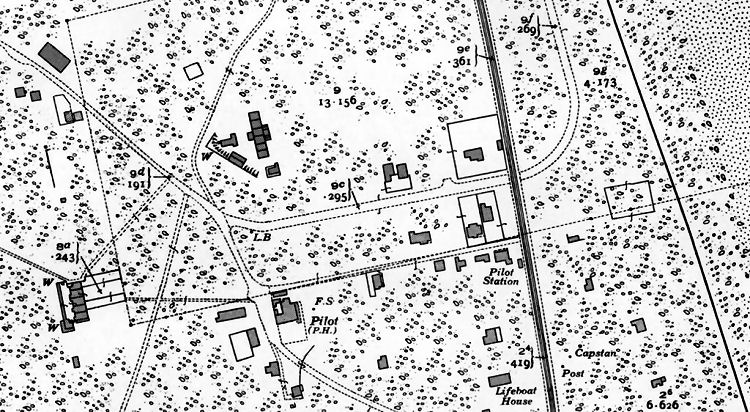
Above map taken circa 1945 during Operation Pluto. |
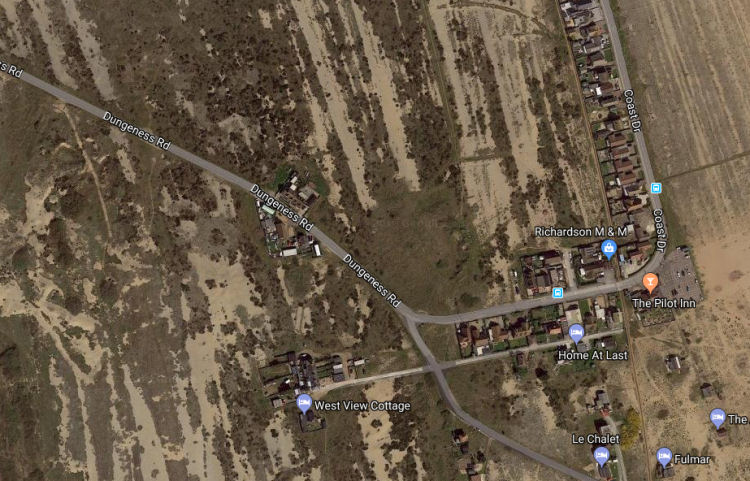
Similar map from Google 2018 showing the "Pilot Inn" is a slightly
different place. |
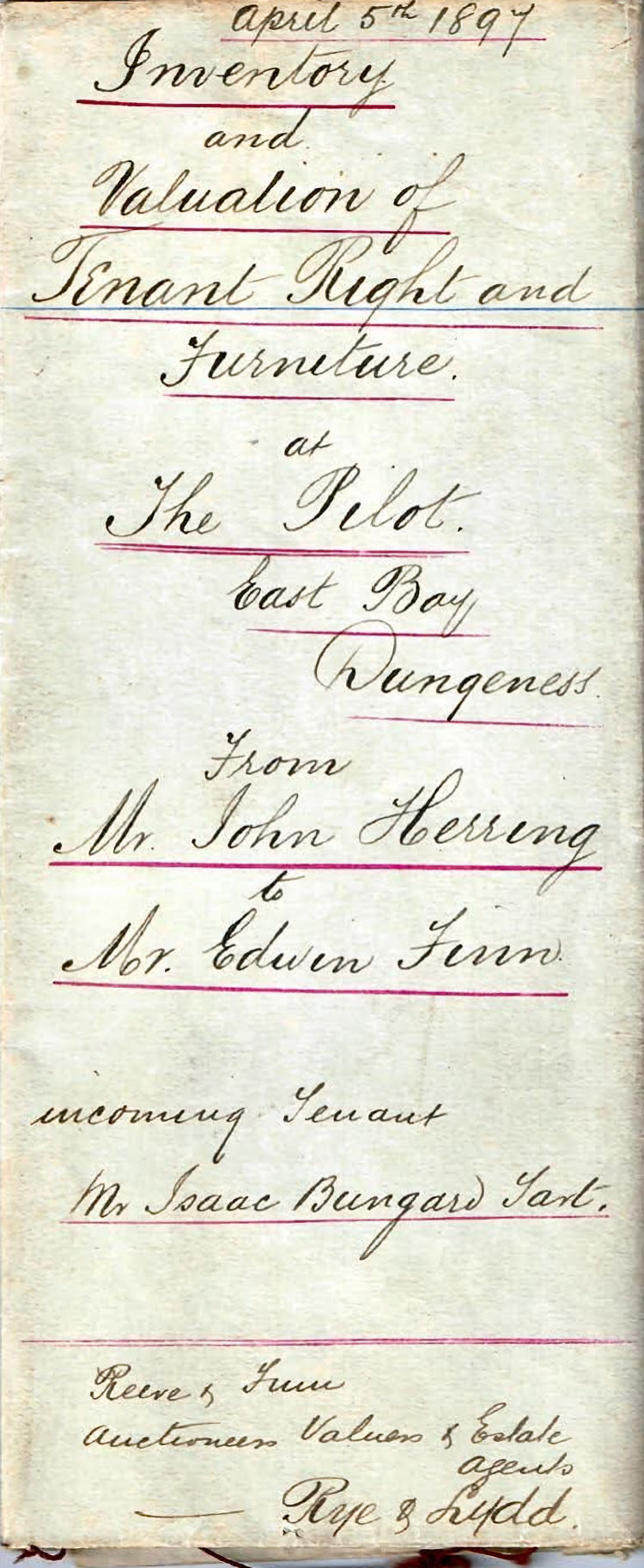
Above showing the lease of the "Pilot" 5 April 1897. |
The "Pilot" was built in 1623, and in 1644 three Spanish frigates were
lured on to the shingle beach nearby. Their crews were brutally murdered,
the ships looted, and the hull of one of them was installed as a ceiling for
what was later the saloon bar of the pub.
|
Kentish Gazette, Tuesday 19 March 1867.
Kentish Chronicle - Saturday 23 March 1867
Wreck and Loss of Life.
On Tuesday night, the weather being severe and boisterous, a Swedish
brig came ashore near No. 1 battery, and became a total wreck. The brig
was called the Nora; she belong to Langesund and was bound from that
port to Barrow, in Cumberland, with a cargo of timber.
The deck-load of planks was saved. The vessel has been stripped. The
crew, with the exception of the master, were rescued by the coastguard
by means of the rocket apparatus.
The captain unfortunately did not properly secure himself to the warp,
and was drowned. His body was recovered.
An inquest was held on Thursday, at the "Pilot Inn," Dungeness, before
Thomas Finn, Esq., and a respectable jury, on the body of Nils Theodore
Moglestone, captain of the brig Nora. According to the evidence of the
mate, Peter Antonia Peterson, the captain mistook the Dungeness light
for the Varsa light, and consequently came ashore near No. 1 battery.
The rocket apparatus was worked under the superintendence of Mr. George
Sweetman, chief boatman, in charge of No. 2 station; and the captain, in
being hauled on shore, caught the warp attached to the apparatus, and
not having secured himself properly he was dragged out of the breeches.
He let go the warp and fell into the sea. The remainder of the crew was
saved by means of the apparatus. The jury returned a verdict of
"Accidentally drowned."
|
|
Folkestone, Hythe, Sandgate & Cheriton Herald, Saturday 1 September 1928.
French Steamer Sunk. Collision with German Barque. Crew of 21 Jump to Safety.
The French trading steamer, "Daphne," was sunk about 20 miles of
Dungeness in the early hours of Saturday after a collision with the
German four-master barque, "Passat."
The cause of the collision is a mystery, since it is stated that at the
time of the impact the atmosphere was clear and there was visibility
over a considerable distance.
The crew of the French vessel, numbering 21 had a remarkable escape from
death.
The "Daphne" was struck amidships and almost at once began to sink
beneath the bow of the barque. There was no time to launch the
lifeboats.
Very quickly the steamer sank, amidst a swirl of water and the loud
hissing of steam from the boilers.
The "Passat" at once turned for the shore with her bows badly damaged
and water pouring into her hold.
The rescue crew were landed at Dungeness at 11 a.m.
Mr. G. Bates, of the "Pilot Inn," Dungeness, brought the crew from the
barque to the shore by motorboat.
They were little the worst for their exciting experience.
The "Daphne" was a vessel of 1,467 tons, carrying a general cargo which
went down with her. She was on a journey from Caen to Ghent. Her port of
register of was Caen.
Most of the French crew were able to jump onto the deck of the sailing
vessel as the ships rode interlocked, but those who took to the water
were picked up by the sailing vessel. All hands were saved.
The Passat was damaged under the waterline of the bow.
Two of the French crew were injured, one rather seriously in the leg,
while the other had a slight cut on the head.
Mr. G. Bates, pilot and steam tug agent of Dungeness, was out in his
motor launch off Dungeness on Saturday and noticing that something was
wrong with the sailing vessel hailed her. He then brought the French
crew ashore, the first party landing at about 8:30 a.m.
The Daphne, whose port of registry is Caen, was of 1,467 tons and was
bound from Ghent to Gaund, with a general cargo, and the Passat, which
is a Hamburg boat, was bound from Hamburg to Chili with general cargo.
The French crew were taken to the "Britannia" at Dungeness and after
being supplied by the Shipwrecked Mariners' Society they proceeded to
Folkestone making the first part of the journey by way of the Light
Railway.
They had been unable to save any of their property and possessed only
the clothes in which they stood. They were little the worse for their
exciting experience.
|
|
Folkestone, Hythe, Sandgate & Cheriton Herald, Saturday 03 June 1933.
Fatal sting of fish. Dungeness fishing man's sad death.
We regret to record the death on the peculiarly tragic circumstances of
Mr. William Robert Tart, of the "Pilot Inn," Dungeness, who died at the
Royal Victoria Hospital, Folkestone, early on Thursday morning.
Mr. Chart, who was 39, was mackerel fishing about a fortnight ago when
he was stung by a weaver fish when hauling in the nets. When he arrived
home he treated the sting, and the next day it appeared to be going on
all right. Later, however, the sting became swollen, and after
consulting a doctor Mr. Tart was removed to the Folkestone hospital on
Monday. Everything possible was done for him, but his condition became
worse and he died in the early hours of Thursday morning.
Mr. Tart was a second son of Mr. I. B. Tart, and the late Mrs. Tart, of
the "Pilot Inn, Dungeness.
He has followed the calling of a fisherman since he left school when he
was 14. He was to have been married shortly.
Mrs. D. Oiller, of Dungeness, a sister of Mr. Tart, told the Herald that
there was no doubt her brother's death was caused by the sting of the
fish.
"My husband was stung some years ago and he suffered a very bad arm.
"I have no recollection of my brother having been stung before.
An inquest.
The facts concerning Mr. Tart's sad death have been reported in the
Folkestone Coroner, and an inquest will be held at the Town Hall,
Folkestone, this (Saturday) morning at 11 o'clock.
The weaver fish has sharp dorsal spines with which they can inflict a
painful wound. It is held that the spines are not in themselves
containers of poison, but they have a covering of slime which causes the
wound inflicted by the spine to fester. The wound bears some similarity
to that inflicted by the tail spine of the sting-ray.
Weavers are scavenger fish and prey on mackerel.
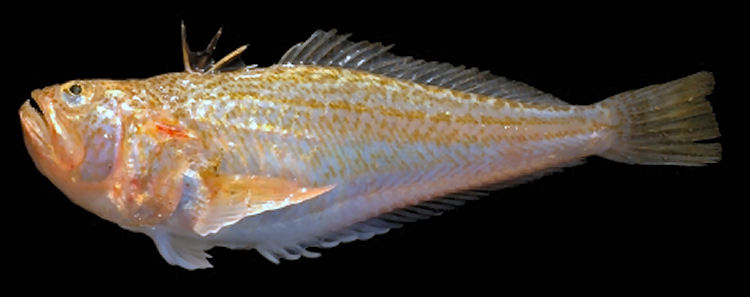 |
|
Folkestone, Hythe, Sandgate & Cheriton Herald, Saturday 23 December 1933.
Miniature Railway Wedding Trip.
From home in a lonely spot on Romney Marsh a bride will be taken by the
specially chartered train of the Marsh coast miniature railway part of
the way to her wedding at Lydd this (Saturday) morning.
The bride is Miss Annie Elizabeth Young, and her home at Lade is 2 miles
from the nearest road, although only a short distance from a line of the
Romney, Hythe and Dymchurch Light Railway.
When Mr. B. Hardie, the traffic manager of the Railway, heard of Miss
Young's forthcoming marriage to Mr. J. A. Bingham, of the Royal
Engineers at Dover, he readily placed a special train at the disposal of
the bride, knowing that otherwise she would have a 2 miles' walk across
shingles to the nearest road. The Light Railway service to these parts
normally consists of one train per week during the winter months.
Miss Young will now have only a short walk across pranks to the railway
line, where she will enter a specially decorated carriage. She will be
taken for a 2 mile journey to the "Pilot Inn," Dungeness, which is on
the road from Lydd to the Points, and from there she will travel to Lydd
by car.
She will be married at Lydd Parish Church at 10:30 a.m., and after the
ceremony she will return to the "Pilot," and will meet the special train
which will take her back to her home.
Miss Young's eldest sister had a similar experience, when she was taken
to her wedding by the Light Railway a few days after the Railway was
opened in 1929.
|
|
Folkestone, Hythe, Sandgate & Cheriton Herald, Saturday 24 August 1935.
New Coastal Road Opening Ceremony Today.
The magnificent coastal road from Greatstone to Dungeness, which has
been constructed by the owner and developer of the Greatstone and Lydd-on-Sea
Estates, Councellor C. E. Andrews, is now completed and will be opened
this (Saturday) afternoon at 3.
The road is all part of a scheme to develop the wastes of Dungeness
Point and turn them into a holiday resort. Where formerly they was just
an expanse of shingle, there are now hundreds of houses of dozens of
shapes and sizes, complete with all the amenities of a town, and all the
advantages of an open seaside resort.
From Littlestone, through Greatstone to the "Pilot Inn," Dungeness, the
road now extends for 5 miles, giving easy access to the Point and
providing immense possibilities for development.
To-day's program will include the cutting of a tape on the boundary of
Lydd and New Romney by the Mayors of the two towns.
Guests will include the Mayor and Mayoress of Folkestone and a number of
well-known country people.
|
|
Folkestone, Hythe, Sandgate & Cheriton Herald, Saturday 14 December 1935.
Extension.
At Lydd Police Court on Saturday, Mr. W. Brown, licensee of the "Pilot
Inn," Dungeness, applied for an extension of licence for 2 hours on
Christmas Eve.
Superintendent Issac objected to an extension for this period.
The Bench granted an extension for one hour only.
|
|
Daily Mirror, Tuesday 28 August 1945.
No smoking since Pluto. Now it's ok.
"Time gents please and put your pipes out."
That's what they've been saying nightly in the "Pilot Inn," Dungeness,
Kent, ever since the Pluto pipeline began to pump petrol from here to
the D-Day armies across the Channel.
But now there's no reservoir of petrol for a spark to explode, so the
local smokers can light up fag or pipe out of doors once more. Can...
But they're doing it very gingerly.
The ban on visitors to the area has been lifted too. So Dungeness
welcomes its sons, its daughters and its holidaymakers with arms that
have not held them since Dunkirk.
But smoking? This is what timorous Dungeness told me last night.
The Police:- "Yes, the public can enter again, but as far as we're
concerned, smoking out of doors is still forbidden. We've had no
instructions to the contrary.
Notices taken down.
The fire force:- "The law still stands which says you can't smoke
outside. But most of the non-smoking notices have been taken down.
People do smoke outside, so it's alright, really. Let me put you through
to the Army."
Who said:- "There are still a few places where you can't smoke out of
doors. Who's enquiring? I must have your name...
Like another world.
And finally, Old Joe Simmons, licensee of the "Pilot Inn." "This place
has been like a concentration camp. The King himself couldn't get in.
"I believe we can smoke outside now. Once I drove to market in Epsom. It
was like going into another world, seeing folk smoking in the open.
We'll get used to it.
|
|
From the
https://www.bbc.co.uk By Craig Buchan, 11 August 2025.
Man charged after car crashes through pub wall.
A black, single-storey building at the side of a tarmacked area, at
night. There is broken glass and several bricks strewn across the tarmac
and a big hole in the side of the building. White guttering and windows
are hanging off the damaged building facade.

Image source, The Pilot Inn.
The Pilot Inn's owner said a car hit the building in the early hours of
Sunday.
A man has been charged with driving offences after a car crashed through
the side of a pub, police have said.
The Pilot Inn, in Lydd-on-Sea, thanked neighbours for helping it reopen
on Sunday afternoon after the incident occurred shortly after midnight.
Officers later charged Howard Sargeant, of Coat Drive in Romney Marsh,
with drink driving and driving whilst unfit, Kent Police said.
The 52-year-old, now on bail, is due before Folkestone Magistrates'
Court on 27 August.
The pub's owner Rachel Miaoulis told the BBC several staff members and
locals helped clear the debris overnight following Sunday's crash.
"I can't believe how people, when we needed them, actually put their
full heart into it, helping us out so we could open," she said.
A single storey building covered with sheets of chipboard. Guttering
runs down the side of the chipboard, which is next to a brown door with
a sign reading 'Entrance'.
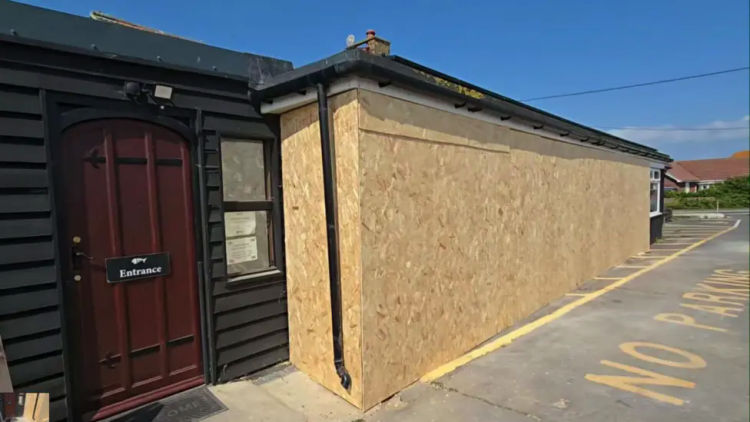
Image source, The Pilot Inn.
The inn has now boarded up the damaged exterior wall.
According to Ms Miaoulis, the damaged section of the premises has been
isolated and boarded up since the crash.
"The damage that it caused is just crazy," she said.
The venue "can't afford to close" in summer, she added, as it is the
business's busiest time of year.
In 2021, a police van overturned after crashing into a telegraph pole
and the pub's signpost. |
LICENSEE LIST
HERRING John 1841-81+ (age 77 in 1881 ) )
HERRING John 1891+ (age 59 in 1891 ) )
TART Isaac Bungard 5/Apr/1897-1903+ (also fisherman age 45 in 1901 ) )

TART Ellen Elizabeth Mrs 1911-22+ (widow age 52 in 1911 ) )
TART Alfred I 1930+ (son age 30 in 1921)
BROWNE William J 1935-38+
MIAOULIS Rachel 2025+
https://pubwiki.co.uk/Pilot.shtml
 Census Census
 From the Kelly's Directory 1903 From the Kelly's Directory 1903
|























